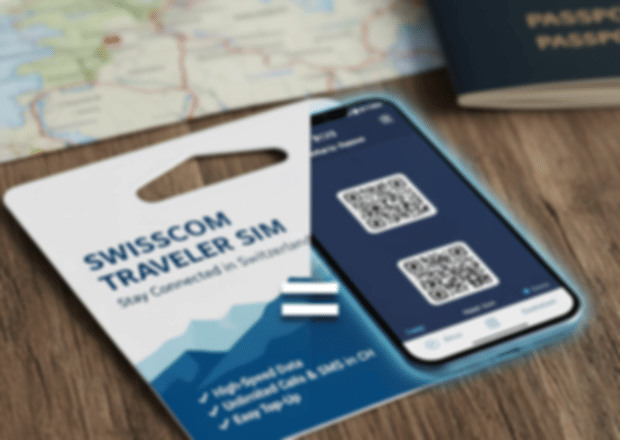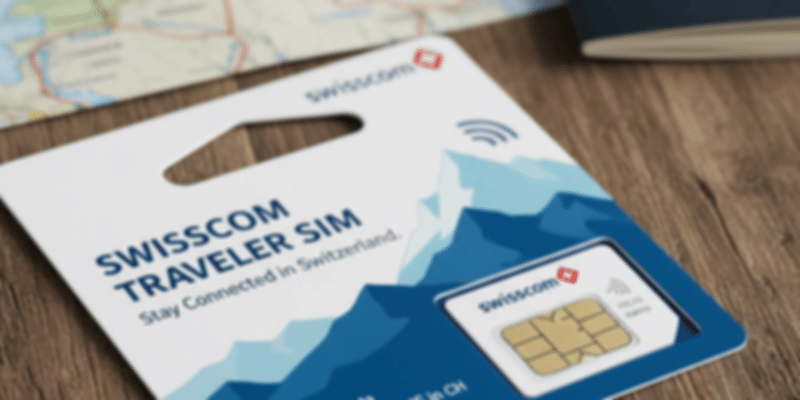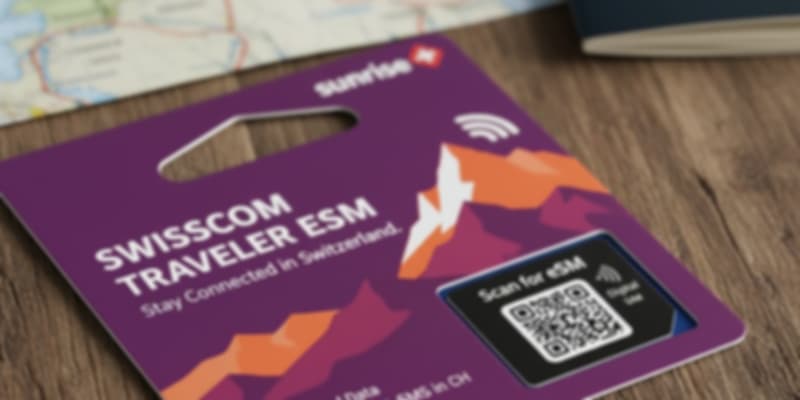SIM Card vs eSIM in Switzerland : Best Option for Travellers

Just because you are in Switzerland, whether you are visiting the Swiss Alps or because you are visiting the Swiss chocolates, or even because you are on a business trip, you will not mind letting your mobile connectivity be sorted first. The SIM Card vs. the eSIM in Switzerland may not seem like a big choice; however, it may leave an impression on your ease of travel. Whether it is travelling around in Zurich with no problems or sharing scenic views in Lauterbrunnen, your internet connection is your life raft of travel.
This guide dissects physical SIM cards and eSIMs, their prices, coverage, how to activate them, as well as the most appropriate ones to use by tourists, expatriates and business travellers.
SIM Card vs eSIM in Switzerland: Detailed Comparison Table
| Criteria | Physical SIM | eSIM |
| Cost (typical range) | Prepaid SIMs cost CHF 10–20 at airports or stores. Top-ups depend on the carrier and data. | Visitor eSIMs range widely; resellers can be cheaper, but compare before buying |
| Coverage & Reliability | Buy from Swisscom, Sunrise, or Salt for top-tier coverage. Swisscom dominates rural areas. | Same carriers mean nearly identical coverage—your provider matters more than the format. |
| Ease of Activation | Show your passport, pop in the SIM, and go. | Scan a QR code, usually before flying out. Activation is instant. |
| Device Compatibility | Any unlocked phone with a SIM slot works. | Only eSIM-compatible devices (iPhone XR+, 2021+ Androids). |
| Roaming & Security | Local SIM = no roaming bills, but easy to lose. | eSIMs are secure and harder to misplace; some include multi-country roaming. |
| Best Use Case | Ideal for locals, older phones, or quick swaps | Perfect for digital nomads, multi-country travellers, and tech-savvy tourists. |
Which Is Better in Switzerland?
In case comfort and time-saving are the most important to you, then use an eSIM. You can order it online beforehand, activate it within minutes and land connected. Even if you are going to rural Switzerland, Swisscom, be it physical or eSIM, remains the coverage winner.
Tips: Always verify the compatibility of devices and details of plans before purchase.
Top Swiss Mobile Carriers and Coverage

1. Swisscom – Best Nationwide Coverage
- Dominates rural and alpine areas
- Offers prepaid, postpaid, and eSIM plans
- Supports full 5G (bands 2100/3500 MHz)
- Ideal for long stays or remote work
2. Sunrise – Best for Urban and Business Travellers
- Excellent 4G/5G speeds in Zurich, Geneva, Basel
- Both prepaid SIMs and eSIMs are available
- Competitive pricing and tourist-friendly plans
3. Salt – Affordable Urban Option
- Reliable across major cities
- Supports eSIM for most devices
- Great for tourists seeking budget-friendly data packs
Swiss MVNOs and eSIM Resellers: More Budget Options
Brands such as M-budget, Wingo, Lebara and Lycamobile rent space from the big three carriers. Others have eSIM but never make a buy without first confirming.
Third-Party eSIM Market
Among resellers, visitor eSIMs supported by instant email delivery are those of Airalo, TSIM, and WonderConnect. Vodafone Travel is just one of the websites where one can purchase ready-to-activate Swiss eSIMs and have straightforward instructions on how to use them.
Where to Buy a SIM or eSIM in Switzerland.
- Internet: Purchase at Swisscom, Sunrise or Salt websites via travel eSIM cards providers. You’ll get a QR code by email.
- In-store or Airport: Buy a ready-made pack at the airports of Zurich or Geneva. Along with your passport is compulsory.
- Through Concierge: Pickyourtrail is able to pre-purchase and install your SIM/eSIM in advance of your arrival.
How to Activate Your Swiss SIM or eSIM

For iPhone:
Select settings – Cellular – Add Cellular Plan – Scan QR code. Name plan and preference of data.
For Android:
Click on Settings – Network and Internet – SIMs/Add eSIM – Scan QR code. Wi-Fi connection must be ensured.
Activation Tips
- Always carry ID or a passport.
- Copy your QR code screenshot or print it out.
- In case of failure to activate: restart, reformat OS, or reform network.
- Test data before departure from the airport.
- Request an old SIM backup to use 2FA or OTP.
Coverage, Speed & Real-World Performance in 2026
Swisscom, Sunrise, and Salt provide LTE and 5G solid coverage in the majority of Swiss cities.
- Swisscom glories in the Alpine and rural areas
- Sunrise works most in urban areas.
- Salt provides good speeds at city rates.
Connection is amazing even in remote alleys. However, when you intend to work remotely in a ski chalet or a village in the mountains, it is always prudent to have an eSIM and a backup SIM so as to be on the safe side.
Device Compatibility & Dual SIM Benefits
Most Androids (2021+) and iPhones (XR and later) can use the dual-SIM mode, which is one eSIM and one physical SIM.
This means you can:
- Have your home SIM on-demand OTPs or calls.
- Cheap local data is available with a Swiss eSIM.
- Easy switching networks in case one of the signals drops.
No speed difference exists between eSIM and SIM – it is all in the network provider.
Common eSIM & SIM Troubleshooting Tips
- Make sure that your phone is unlocked and that it has the eSIM
- In case your QR code does not work, ask them to give me a new one.
- No service? Toggle data roaming or select the network manually.
- eSIM disappeared? Redownload it or call carrier support.
- Carrier help numbers should be kept in mind during the time of traveling.
Swiss SIM Card ID Verification Rules
- Any SIM, including those at the airport kiosks, must be purchased with a passport or national ID
- Electronic ID checking may be required for online eSIMs
- Store your documents so that they come easily.
Which SIM Type Is Best for You?
| Traveller Type | Best Choice | Recommended Carrier | Why |
| Tourist / Short Stay | eSIM or Prepaid SIM | Swisscom / Sunrise | Pre-purchase and activate instantly; no airport queues. |
| Long-Term Resident | Physical SIM / Contract | Swisscom / Salt | Easier billing, better long-term plans. |
| Business Traveler | eSIM + Physical Hybrid | Swisscom Business / Sunrise | Dual connectivity for reliability. |
| Multi-Country Traveler | Global eSIM | Airalo / Vodafone Travel | Seamless roaming across borders. |
| Data-Only User | eSIM data plan | Airalo / Swisscom | Ideal for tablets and hotspots. |
Before You Fly: Switzerland Connectivity Checklist.
- Make sure your device has eSIM support (#06# – check EID).
- Compare Swisscom, Sunrise, and Salt.
- Save your QR code securely.
- Pack your old SIM for OTPs.
- In case of doubt, travel planners of Pickyourtrail can set setup.
Switzerland Tour Package Starting @ ₹89,412
Summary: Stress-Free in Switzerland: Stay Connected.
It is not only about picking between a SIM card and eSIM in Switzerland; it is also about freedom and convenience. When you are a traveller who appreciates simplicity, eSIMs cannot be beaten: they activate fast, they do not put you in queues, and you have immediate internet access on landing. In case you are staying longer or you are going to remote Swiss villages, a Swisscom physical SIM would provide you with quality coverage wherever you are going. Want zero setup stress? The Switzerland tour packages offered by Pickyourtrail might have pre-installed eSIMs, complete connectivity, and a local guide.
Frequently Asked Questions
Q1. SIM card or eSIM in Switzerland: Which is better?
When your phone can handle eSIM it is quicker, tidier and perfect to use with a tourist. Physical SIMs are still applicable in older equipment or long-term occupants.
Q2. Where to purchase a SIM or eSIM in Switzerland?
They are sold in airports, carrier stores or online through Swisscom, Sunrise or reputable eSIM resellers such as Airalo or Vodafone Travel.
Q3. How much does an average Swiss SIM cost tourists?
Physical SIMs are charged in advance, between CHF 10-20, whereas eSIM can be between CHF 6-30 depending on the data and time.
Q4. Is it possible to have the same SIM that would work in Switzerland and other neighbours?
Yes! Most travel eSIMs have multi-country coverage of Europe. Check before purchase.
Q5. Is a SIM purchase in Switzerland ID required?
Yes, physical and eSIM activation require a passport or a national ID.
Q6. Which carrier is the most appropriate in rural coverage?
Swisscom is a market leader in rural and alpine regions whereas Sunrise and Salt lead in urban regions.
Q7. Is there a way I can continue using my SIM home as an eSIM?
Yes. The majority of phone models allow you to use both–have your home SIM that can be used to make calls/OTPs but the Swiss eSIM to use data.
Recommended articles for you
Discover Packages


Need help in planning?
Talk to our Travel Experts






























